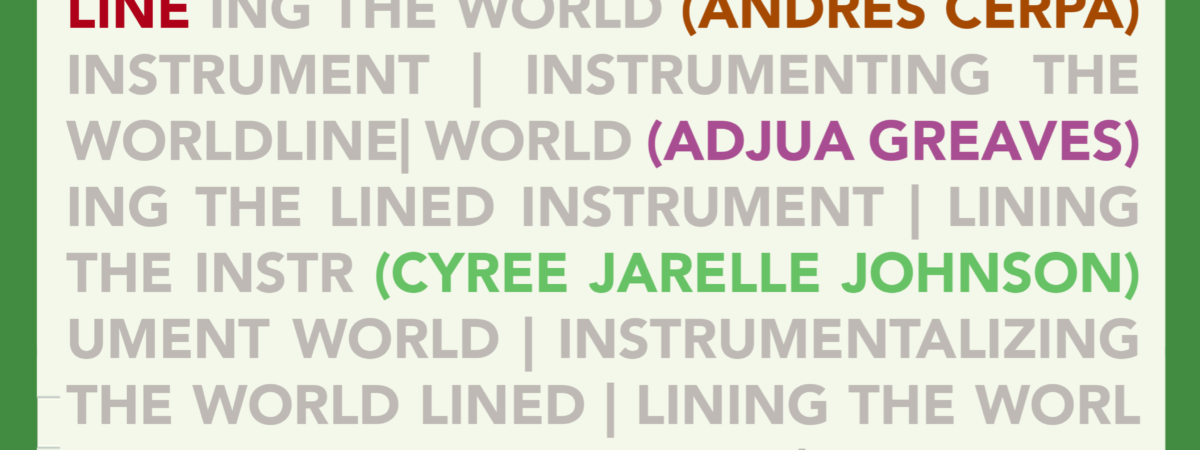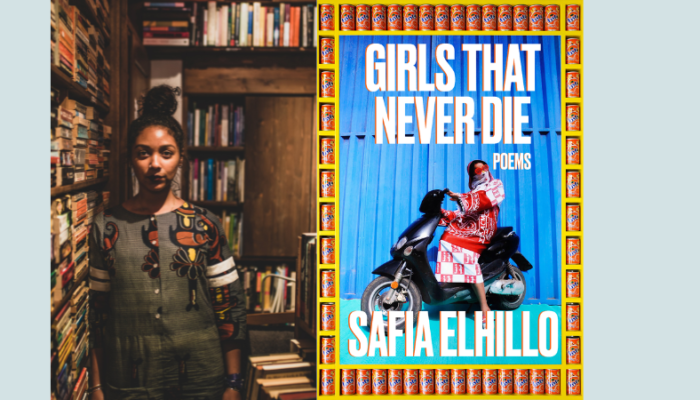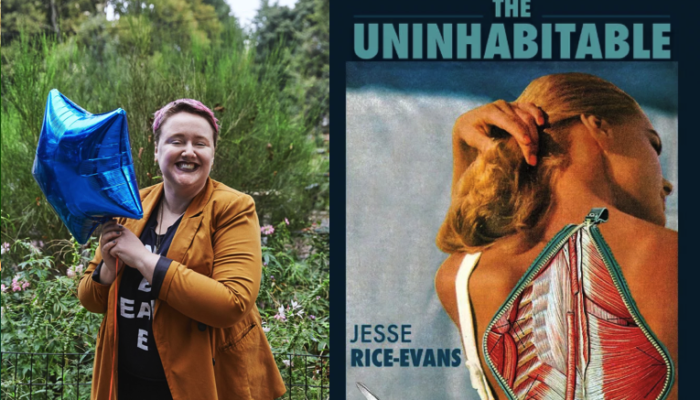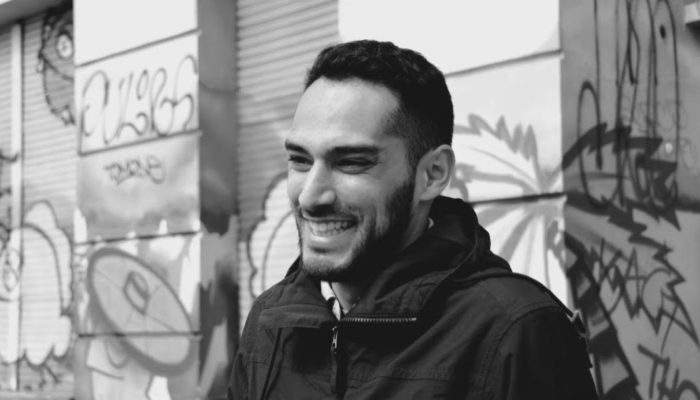Andrés Cerpa, Cyrée Jarelle Johnson, and Adjua Gargi Nzinga Greaves on Resistant Spaces, Plant Life, and Instrumentality
Andrés Cerpa, Cyrée Jarelle Johnson, and Adjua Gargi Nzinga Greaves are three thinkers and writers engaging in intersections of writing and the body, creating new and resistant spaces through their craft. In this talk, moderated by Apogee poetry co-editor Zefyr Lisowski and reviews editor Crystal Yeung, the three talk about worlds, instrumentality, selfhood, plant life, care, and more. The full, brilliant video is below—featuring poetry readings and a wealth of other knowledge. Excerpted questions and responses follow.
Yeung: Adjua, you work as an ethnobotanist, investigating human relationships with plants—looking at a user/used relationship analogous to oppressor/oppressed. What is being created in your work, and what is this gesture as poetic practice, especially given its political implication and power to rewrite narratives?
Would you consider your enthobotany counter-anthropological work? Following Lebanese journalist-academic Ghassan Hage’s argument that the history of anthropological knowledge is the history of white colonial knowledge, infused with colonial knowledge, but also the desire to understand ways of being other than our own?
Greaves: I want to be very clear: this question is why I said yes to this panel.
I think it’s really interesting to think about pervasive colonial desire. I don’t want to say there’s one way we’re encouraged to be, but in myself, having been brought up adjacent to privilege but under the heel of everyone else with privilege in the United States, I really have to watch within myself the desire to conquer. I know better, but conquering is the model of success that I see the most.
And building off of that, my work tries to get ahead of where our species is in terms of our relationship to other forms of life.
This clarity came as the reality of the murderous police state was coming into crisper and crisper focus for myself and my white middle-class peers. In 2015 especially and during the fallout in 2016, I found that I really could not continue to have real conversations with my white friends about the value of all life. I couldn’t. It was unbearable. I didn’t realize where the racism was in white people who think that they’re doing the right thing. I didn’t realize how little Black life and not white life was regarded, and the subtleties of that, until I saw that some people thought it was a complicated issue that police were murdering people on the street. I didn’t realize that anyone would find that complicated. I can see within myself a parallel kind of user/used relationship that’s not in line with the rest of my being. While many of my white friends were confronting this murderous police state that they were benefiting from, they didn’t realize that they had existential reliance on injustices being the way they are.
So what I needed was to look to my relationship to the plant life that I brought into my home and think about how those beings that are essential to human happiness, that are sedentary and ubiquitous and slow-moving and unknowable in many ways, how they’re being regarded by the overarching culture. At the time I was having to think about plants, but now having done this work with ethnobotany for a number of years, I see that more indigenous and more brown groups of people are less confused about the value of plants. And so the project is also to look at where whiteness lodged itself inside me: to flush it out, I need to look at the plants I bring into my home, that I interact with casually or actively in my surroundings and to encourage other people to do the same. Many people don’t need to do this work, but many more people that I interact with every day really do.
That’s all to say that my writing is anthropological in that I’m terrified of humans and what we refuse to see inside of ourselves. And I’m terrified of the ways that the white supremacist culture that I’ve been raised in wants to hide within me and not be exorcised. And looking at my relationship to plant life is direct and pleasurable and I want to get at that.
Yeung: You’ve also chosen to rename some of the plants names like Shaquille, and in doing so you’ve done away with some of the more Latin-based names. What was that like?
Greaves: Shaquille was a shamrock plant I bought in 2015, but in the act of bringing that plant into my home I needed to distinguish it. In the same way, it wouldn’t surprise many people to name a dog or cat, but most people don’t name plants because they don’t have faces and they can’t/won’t relate to them as individuals. The naming is not that I’m trying to superimpose a different name on the Latin structure, which as far as I can tell is useful. Instead, I name my plants after individual people or what are traditionally Black names because I think that all plants are Black people.
Johnson: That’s so interesting! But hearing you say that I’m struggling with it because of the relationship of humans who are stripped of humanity. All humans are animals, but Black people were forced to be animals. It’s a fundamental thing that informs what racism means. There has to be a bottom to inform what whiteness means, and we can understand what other racialized categories mean in the abject starkness of whiteness and Blackness.
But even so, the relationship of all people, particularly Americans, to animal life is colonial, and does change their names. I think about how my name is Cyrée—I was born in 1989 in that rise of Black names–it’s made up! It’s not Swahili, it’s not an Africanized name, it’s specifically and particularly made as a kind of hopelessness, where: not only will I not know where my folks are from on the continent, not only can I not go back, not only is the journey to a homeland colonial and fraught–all we can do is make what’s here.
As a hoodoo practitioner, it’s super essential for me that there are folk names for roots and plants that we use. But at the same time, I’ll never know what the plant calls itself, in the same way white people will never truly understand how to pronounce my name, even if I make a pneumonic device. I appreciated Adjua’s attempts to think through naming, because it’s so complicated, but I’m essentially waiting for the plants to speak. I feel that naming plants is essentially calling me ‘Toby’—and it hurts, it hurts to think that.
Lisowski: How is a poem an instrument for you? An instrument for what? Do other voices that are not your own enter your poems as you read or write them? Have you invited them in?
Andrés, you said on Twitter in May, in reference to your voice recorder, “change the tool/ change the poem.” What tools do you all use in writing? What ways do you cultivate or encounter change in your work? What are your listening practices?
Cerpa: There are quite a few voices that are coming into my poems. They’ve been rude to me, but sometimes they’re not. When I conceptualize what’s happening between words and lines, poems are filled with trap doors, secret rooms of influence and reference. Writing a poem becomes this whole other system, a system that has given me deeper access to my own humanity, given me a place where I can contemplate things in words and phrases. The voices are often gentle, quiet: it’s a conversation, but a conversation that can move in a lot of different directions.
That idea of a trap door holds, in its phrase, other voices. The importance of becoming an instrument and voicing out loud these other sorts of meanings: the world is so filled with empty speech, and if we can move towards looking underneath the words that we use and see the system that is happening that gives that thing meaning, then that’s hopeful.
Being able to bring the physicality of my voice into a space and share the poem, in that way, face-to-face with other people generates a momentum and becomes more and more important, at least to me and hopefully to those who are also now interacting with the poem.
Greaves: I think I’m going to have to answer that question in two parts. There’s a physical way that I like to feel, and that’s where I’m hearing the voices from deep inside myself, and one of the things I believe is happening is that… when I have fed myself well, especially when I’ve fed myself a lot of water and plant matter, my internal organs are vibrating in this really beautiful wavelength. Everything internal is different. And so I’m thinking differently, but I’m also hearing my thoughts differently, and it feels like I’m able to receive different wavelengths—less my own voice and more other communication. That’s the listening.
I feel that I need to become an instrument to generate the poem, which is itself another kind of instrument. And then I see the effects of the poem, the instrument that my instrument has created, on other people, and you can see the waves of influence—too rare, right now, but as I’m building more of a life its happening more and more. I love that question.
Johnson: I feel like specifically as a Black trans poet, I really struggle with the idea of voice. I was a child public speaker, and I did Poetry Out Loud as a teen, and then I swerved away from it to other kinds of art. I’m a first generation college grad, from a small town in New Jersey, and no one really discussed professions with me, but I got the sense that “artist” wasn’t really a valid choice. For a while I struggled with whether I should continue writing or if that’s just for people with trust funds, and although I never stopped writing, I did stop sharing it with people.
I had an opportunity early on to speak at the Trans Health Conference, and realized:if I didn’t address certain things or speak in this certain voice, would other trans people even read my poetry?
Finally I cobbled together this forthcoming book, SLINGSHOT. I don’t think of myself as a particularly lyric poet; some people think of their poetry as an instrument, but I think of it as a tool. Free verse lyricism is something I’m not particularly interested in. But the core of Slingshot is a 48 page poem told in two voices, a trans adult who is a really terrible activist and his mother who is an exotic dancer who gets caught in a strip club raid. And it alternates between their points of view, which are a splitting or shattering of my own point of view.
In an earlier edition of the work, because it’s an anti-FOSTA/SESTA work, it was looking at the outcomes of a strip club raid, especially incarceration. I write with a muse and talk over the book a lot with him, and at a certain point he was like, I don’t think it’s right for you to write about incarceration. And I had to sit with it, and the book really changed. I struggled with whether to represent that balancing reality, where if you don’t represent it, it feels like you’re leaving out the entire story, but who or how and why and when–there’s no easy answers.
It really rattled me to think about what you can write about in a poem. For instance, I’ve never experienced enslavement, so can I write about slave ancestors? And not can I, but in what ways will it always be incomplete? In what ways can I always acknowledge that it’s incomplete?
I think I worry that readers are becoming less willing to engage with things that turn out negatively and things that do not yield some sort of positive social outcome. That are just bad. If you are a diverse person who chooses to be like, this is bad, it might not get better, you don’t get as far as someone who’s like, everything is terrible but tomorrow is okay! But for me, I can’t give you joy all the time. My joy is very expensive, and even I don’t get it all the time. All I can do is write about what’s actually going on. But even then, I’m situated in the global 1%, and just finished my second masters.
And delving into that more: as a queer trans disabled person, as a Black person, I experience a lot of oppression in my day to day life—serious, violent oppression. But at the same time, I have more vested power then most of the people in my family, even though they do not share my specific identities. What’s our responsibility to others who might not speak the same language of queerness or transness? What’s the responsibility to complicating our relationships, even if I might have more oppressed identities?
Lisowski: This is going to try and suture two different questions together. The past few questions have been talking about love and it immediately caused me to think about the complexity of love as resistance. The ways that love can be an anti-colonial move, but also the ways love or the illusion of love can be used to justify coloniality. I’m thinking of Chela Sandoval, who popularizes in her book The Methodologies of the Oppressed the idea of love as this type of resistance. And there’s this distinction that she doesn’t quite make in the book: not all love is resistance. There’s a very specific type of love that she’s talking about. I’m curious what are the ways in which love or care or care work are resistant to you—is that something that you’re even interested in, in your day-to-day lives?
Greaves: Can you say that question again? After care work?
Lisowski: Yes! Let me just rephrase. How do you negotiate tensions between love and care, firstly? And secondly, how do you negotiate the tension between (1) love/care as an ameliorative, rehabilitative act, and (2) love and care as something that allows types of oppression to perpetuate because it has this scrim of “everything’s fine, don’t worry.” Is that a little bit clearer?
Greaves: Yes.
Johnson: Love: I like it. I’m a Pisces, and my Venus is in Pisces, so I really like it. Oh goodness.
I think my poetry’s best suited for talking about complex things, so: there’s this way that people have been saying that the idea of monogamy treats love as though it’s scarce or finite, and one of the things I’ve been holding in my poetry specifically is that love may not be finite, but time is. I really do not have a lot of time.
And complicating that further: I come from a family who can work a love root, but the bad part about that, is that not only can you impede someone else’s free will, you also have potentially impeded your own happiness. You don’t really know what you want—because no one does, for real for real. And that’s the reason I work in poems.
I think that queer people in specific really love bromiedes about love: like, ‘every one is inherently loveable.’ But those same people also, say, only date people under 90 lbs, so even if you’re loveable they won’t be loving you. Or like, “I love all Black people, especially if they have curly loose hair, and light skin, and maybe some freckles.” That’s how people be! They look you in your face and say the slogan and that’s what it is. Or get really into not saying “disabled,” but, like, you’d never be with a disabled person! You’d never, ever do it. As an autistic person, as a black and white thinker, that shit’s really hard for me. I saw you saying this! You said it, but you didn’t do it. It breaks me apart. When people say, “oh, I’m anti-racist, I want disabled people to succeed,” there’s nothing that tears me up like that. How can you get so much power telling such a big lie.
But that’s how people get power, telling big lies! People out there keeping it 100 never get to have power, or very often don’t get to have power.
Greaves: The tension between love and care is the reason why I couldn’t quite hear your question before—it’s such a profound remove from me. When I think about that question, one of the things I think about the most is how many people will say,“I love you, I love you,” and then the shattering isolation that is the truth of their love. Their love is very casual.
I think that as I get older, as things have been harder for me for longer, I have sought out different kinds of help. Finding and receiving different valences of help and starting to feel what it looks like when somebody loves you is startling. It’s startling, and also heartbreaking to see how different that sort of love is from all of this other attention and work.
I’m really wary of the word love in this pairing with the word care, because I think that care has a lot less cultural bullshit around it. I think it’s clearer to people that care comes from a wound, or to prevent a wound. The way we’re all vulnerable, I’d say all of us wounded, is important, and I’m much more romantically/sexually interested in people who show that capacity for care.
Then, love is—I feel really casually about it too sometimes. I’m currently trying to figure out what it means to be falling in love with somebody’s thought process and mind, and if that means, say, wanting to make out with them. It doesn’t always, but it certainly feels like it. Love, I’m really annoyed with that word, but care is very important to me.
Cerpa: I think about how the expectations of love are extremely gendered, and how intense that is, and how it’s passed down in different ways. My parents were very much in love—my dad was diagnosed with Parkinson’s at 44, he died at 60, and my mother cared for him. Intensely, was intensely devoted to him.
There is a beautiful embodiment of love in caring for someone with a degenerative disease. But it is also frightening—my father, having no control over his body and the things that were happening to him, and therefore by extension happening to their relationship, felt immense guilt because he too wanted to care for my mother and his children. When he had psychological breaks, he referred to himself as a Judas. And at that moment, I’d like to read a poem from my book, which ends: The currency of love is self-sacrifice.
Andrés Cerpa is the author of Bicycle in a Ransacked City: An Elegy (2019), and The Vault (2021) from Alice James Books. A recipient of fellowships from the McDowell Colony and Canto Mundo, his work has appeared or is forthcoming in Ploughshares, Poem-a-Day, The Kenyon Review, Boricua en la Luna: An Anthology of Puerto Rican Voices, The Rumpus, Frontier Poetry, West Branch, The BreakBeat Poets Vol 4: LatiNext + elsewhere.
Cyrée Jarelle Johnson is a poet/librarian from Piscataway, NJ. SLINGSHOT, their first book of poems, will be published by Nightboat Books this September. Find them online at @cyreejarelle or www.cyreejarellejohnson.com.
Adjua Gargi Nzinga Greaves (New Yorker, b. 1980) is a Pushcart-nominated poet concerned with postcolonial ethnobotany, the limits of language, and archive as medium. Greaves has most recently been published in the collections Letters to the Future: Black Women / Radical Writing (Kore Press), and Creature/Verdure (Pinsapo Journal), as well as in her chapbook Close Reading As Forestry (Belladonna*). Publications in The Brooklyn Rail and from Ugly Duckling Presse are forthcoming. Formerly a Monday Night Reading Series curator at The Poetry Project, she will be an artist-in-residence with The Robert Rauschenberg Foundation on Captiva Island, Florida in early 2020 and serves as Site Director of Wendy’s Subway in Bushwick, Brooklyn.




